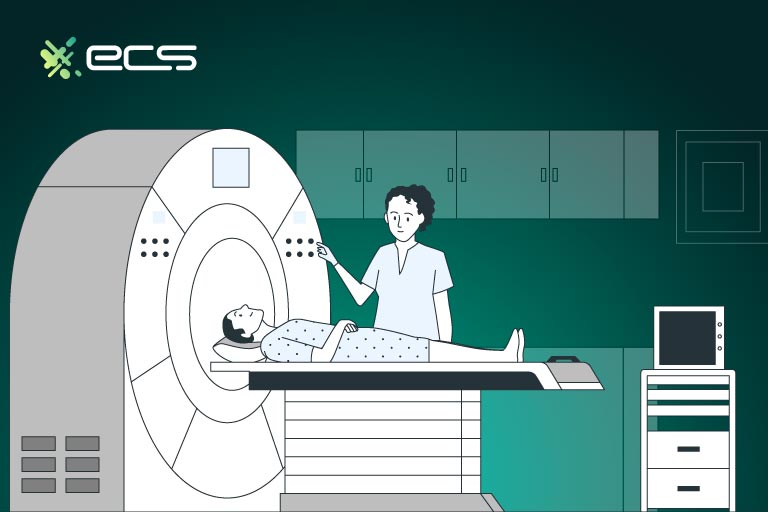Operating a medical practice involves a lot of administrative tasks that are often not directly related to caring for patients. These administrative tasks, such as invoicing, billing, and payment collection, are necessary but have associated costs. However, the right payment processing solutions for healthcare can eliminate time-consuming and revenue-draining manual practices.
When staff are completing tasks manually or only partially automated, problems arise. Running duplicate invoices and mailing them out with requests for a paper check is expensive, and each notice further reduces revenues and increases costs.
Then, you have the labor required to handle these tasks. Labor costs have increased in the currently tight job market. As a result, many practices are looking to automate everything they can to help keep these rising costs in check.
Automating these healthcare payment processing tasks also has the added benefit of allowing your current staff to focus on more important tasks like caring for patients.
But automation doesn’t just reduce cost. Automating billing and payment collections also improves the patient experience. With different ways to pay and manage their healthcare costs, patients can have a much more positive overall healthcare experience.
Below, we’ll explain how certain payment processing solutions for healthcare can improve customer experience and lower costs by using innovative billing and payment technologies.
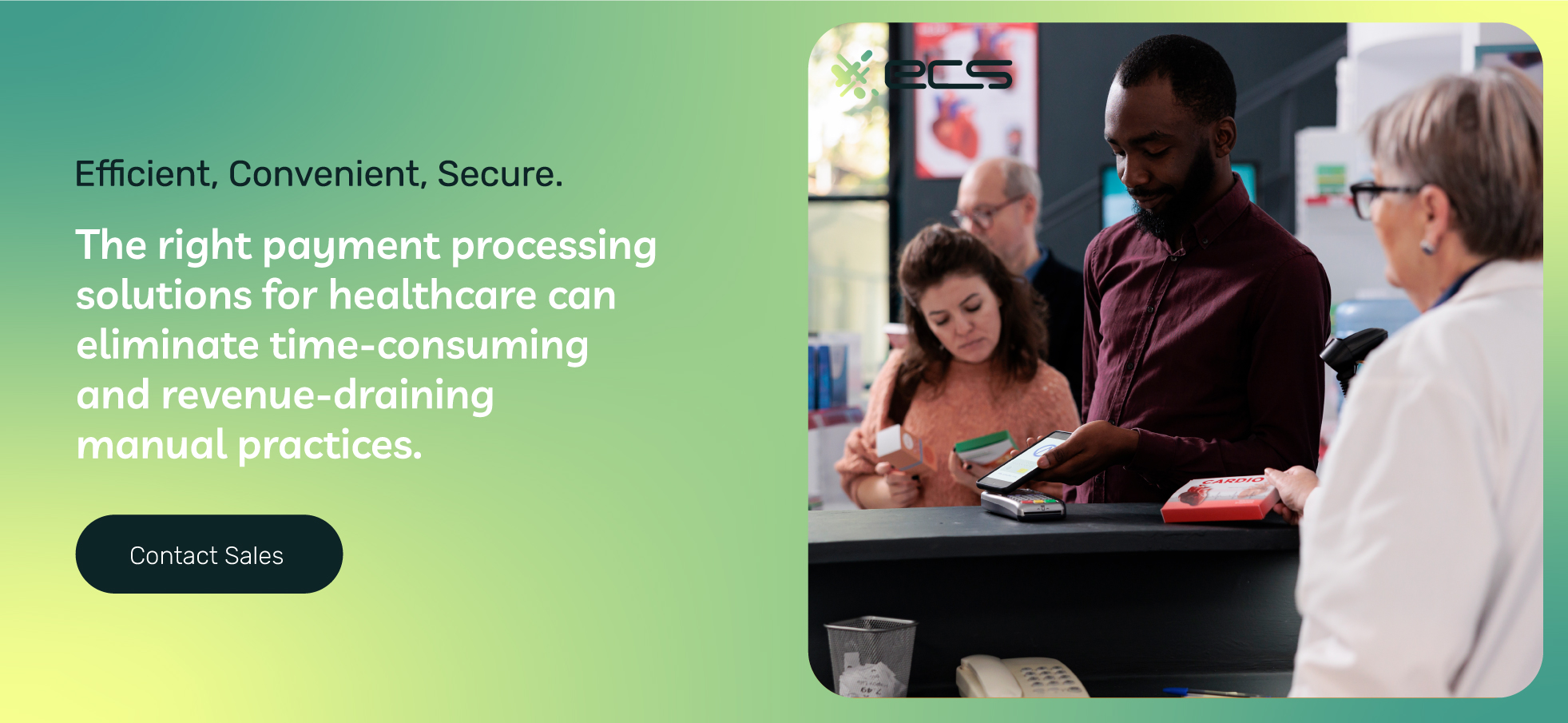
Determine Which Areas Of Your Practice Can Benefit From ECS Payment Processing Solutions For Healthcare
We’ll discuss several methods and technologies to help your practice save money. Still, it’s important to identify the areas within your practice that could benefit the most from specific healthcare credit card processing improvements.
You can examine a few key areas to see where your main inefficiencies or bottlenecks may be occurring. Once you identify these, you can implement the appropriate payment technology to help address those problems.
Medical Practice Payment Collection
If you’re having a low response to paper invoices and have to send more than one to get a response, that may be an area you want to focus on. Paper invoices are time-consuming and expensive.
These days, they also get a lower response than more updated methods like SMS messaging or emails that contain billing links.
Patients prefer to receive texts or emails instead of mailed invoices. This type of personalization is a great opportunity to improve patient experience and speed up the time it takes to receive payments.
Lack Of Payment Options And Channels
Consumers and patients want choices when making payments, either for a copay after a visit or paying a balance for services already received.
One example is using digital wallets such as Apple Pay or Google Pay for medical credit card processing. These are becoming increasingly common, especially among younger patients, but older patients are also adopting these methods. Some patients who use these digital wallets on a regular basis no longer carry their credit cards with them.
Having the correct hardware in the office to accept these newer digital wallets can improve patient experience and streamline your reception area to reduce bottlenecks and increase the number of possible appointments.
There are many other payment channels that you also want to offer. These include pay-by-phone, payment links, pay-by-text, and ACH or eCheck payments.
No Payment Plans Or Recurring Billing
Setting up automated recurring billing plans that debit the agreed-upon amount each month saves time and money for many practices. However, some practices don’t have the billing technology implemented for this type of medical payment processing.
Payment and even membership plans are becoming more common in healthcare settings, and they open up new automation and cost savings opportunities.
You can easily implement these services into your existing billing workflow with the right payment processor and the tools it provides for your practice. Some practices use a third party to handle these payment arrangements, but those services can charge high fees, adding an extra layer of complexity to your billing.
You can handle many of these situations internally with tools provided by payment processors such as ECS Payments.
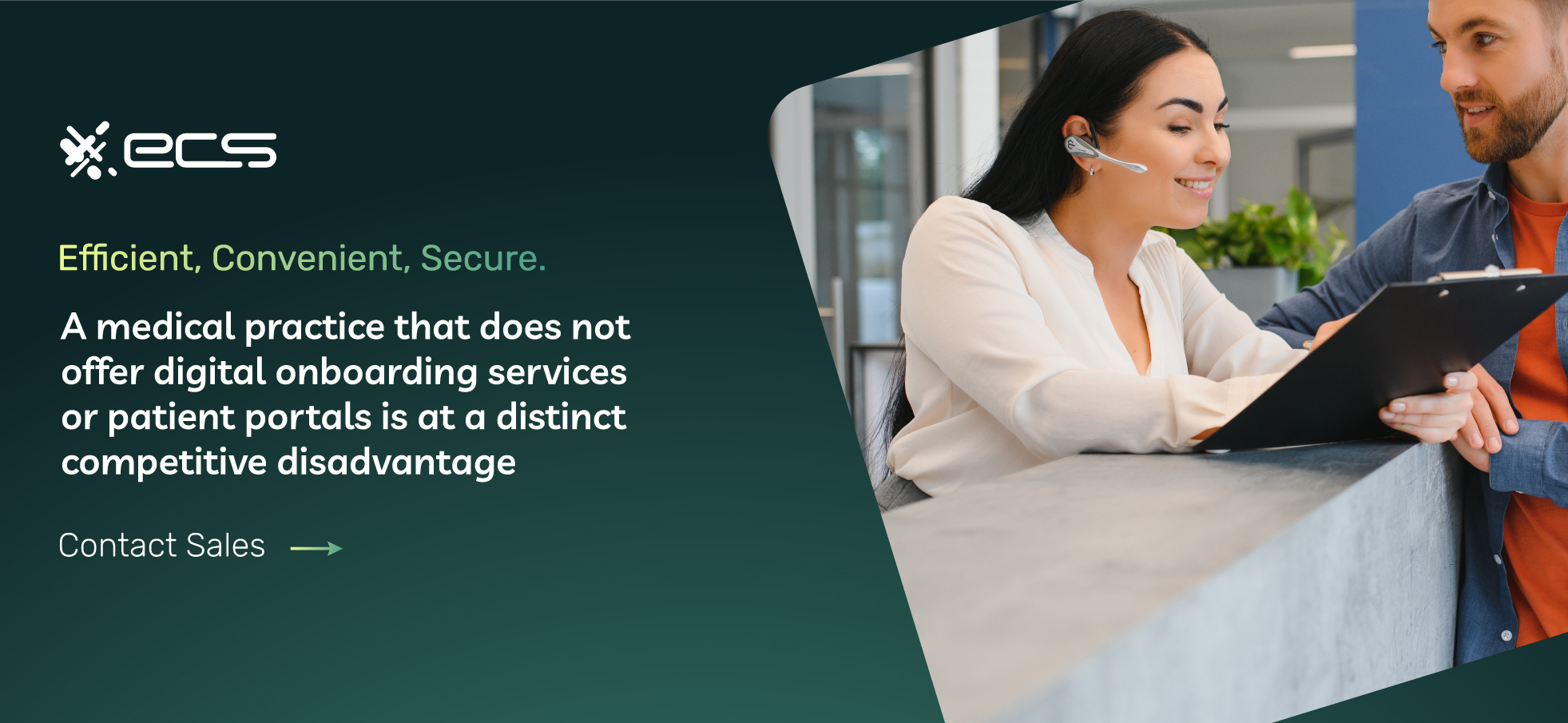
Lack Of Growth Or New Patient Acquisition
Some practices may be having trouble growing or acquiring new patients. Part of this problem could be due to a lack of technology around billing and onboarding.
Patients and consumers alike have become accustomed to doing most everything digitally. This includes signing up for new services and even obtaining complex services like loans. Users or patients can also pay any fees associated with these services digitally.
A medical practice that does not offer digital onboarding services or patient portals is at a distinct competitive disadvantage, especially when looking to grow and acquire new patients who have grown accustomed to this technology.
Implementing these technologies is not difficult, but it requires the right payment technology and payment processors who offer the tools you need to seamlessly transition.
In the following sections, we’ll go over the specific payment technologies that can address all of these issues, along with several others that can lower costs and improve patient experience.
Payment Processing Solutions For Healthcare: Payment Links
Payment links can help your practice automate invoicing and increase the speed at which you receive payment.
Providers can send a patient a secure and private payment link via email, QR code, or SMS/text. The link directs the patient to a secure page. The medical practice can fully brand the site with its name, logo, and other details.
The patient can then complete their payment on this page or, in some cases, make adjustments to their payment schedule or amount.
Though a provider can send payment links manually, they are most effective when automated through integrated payments.
Integrated payments means linking your practice management software to your billing system. In this case, your practice management software is integrated with your payment gateway.
ECS Payments, a leading healthcare payment processor, offers several different payment gateways to simplify integrating your payment solution with your existing software.
Once you complete this integration, the system can automatically send payment links when bills or invoices are due to be issued.
You still have options even if your practice doesn’t use management or billing software that can integrate with your billing solutions.
Various payment gateways have their own invoicing and billing systems that your staff can access for sending payment requests. These will use the same payment links described before, but staff or the patient must enter the information manually, at least at first.
You can set up recurring links for patients on billing plans or other arrangements. So you can still benefit from this over paper invoices and checks even if you don’t have the latest practice management software.
Upgrading to newer software enables a seamless transition, as the payment gateway can export customer data in various formats, which you can subsequently import into your new software.
ECS’s Low Fees For Payment Processing Solutions For Healthcare
We understand it is always a top priority to lower costs associated with your billing and payment collection. Your payment processor and merchant account can play a significant role in saving money.
Depending on your current processing arrangement, you may be paying higher fees than needed. This can be especially true if you obtained a merchant account long ago and haven’t updated the terms or shopped around for alternatives.
The type of merchant account you have and its associated fee structure can also pose an issue. There are various fee structures, such as flat rate or interchange-plus, that all have their benefits and drawbacks. Making sure you’re processing under the best fee structure can result in serious savings year after year.
These fees are when you process patient payments via card or check. This is different from virtual credit cards, which sometimes health plans offer to reimburse for services. The health plan charges these fees, not your credit card processor. So be aware of these insurance plans that use a virtual credit card instead of an EFT, and see if you can opt out of their virtual card payments.
For all of your other patient payment processing, it’s wise to ensure you get the best rates. If you’re unsure about your rates, contact ECS Payments and speak with one of our experts. We can analyze your transaction volumes and offer you a rate comparison so you can see how much you would save under a different fee structure.
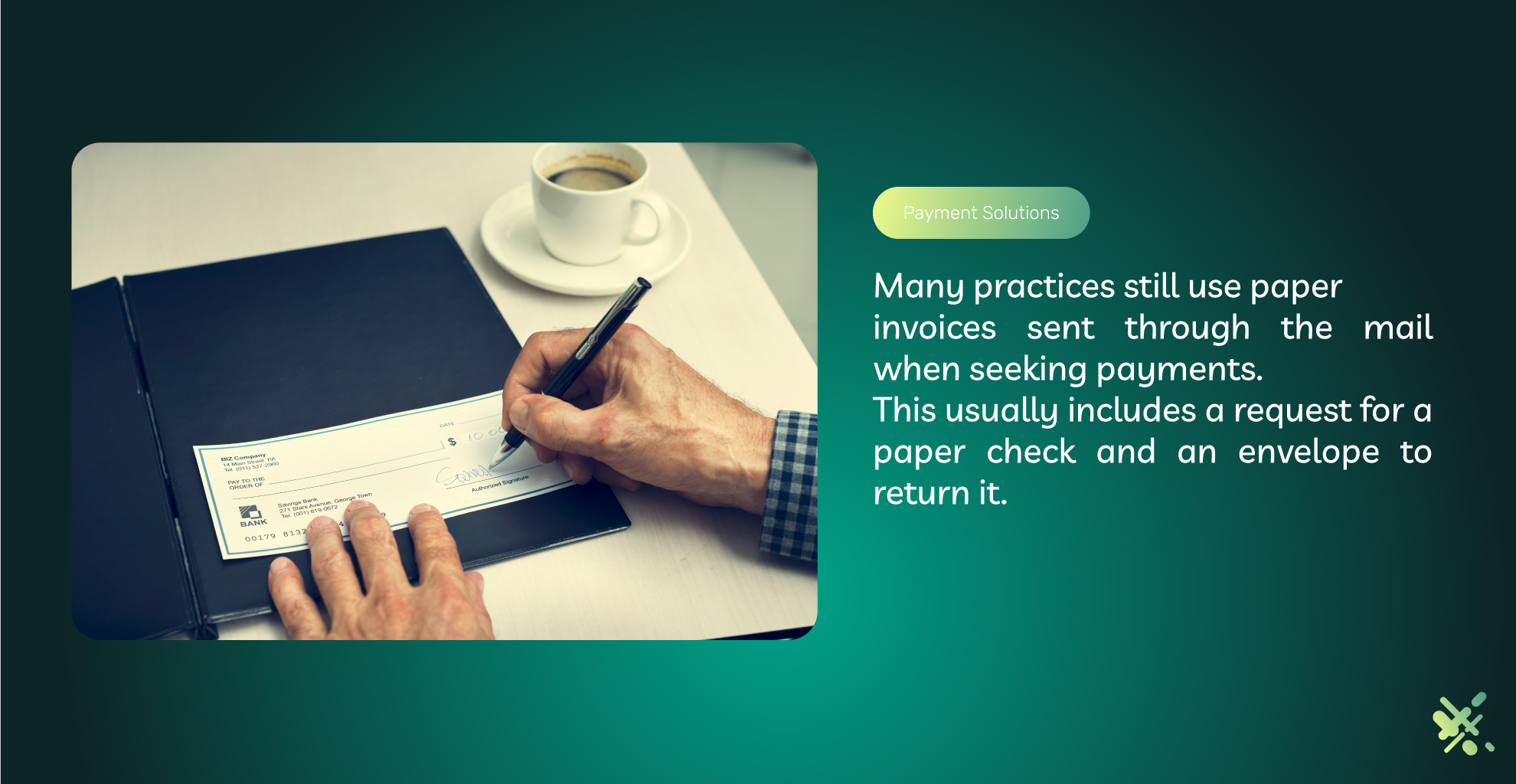
Payment Processing Solutions For Healthcare: eCheck and ACH Payments
Many practices still use paper invoices sent through the mail when seeking payments. This usually includes a request for a paper check and an envelope to return it.
This method is incredibly slow, but there is also the issue of dealing with paper checks. It’s difficult, and processing paper checks often has high fees that are only getting higher as checks become less popular as a payment method.
One cost-saving method for medical practices is to convert paper checks into eChecks or ACH payments. Staff can do this at the point of sale or reception area when accepting a check in person.
But you can also accept checks online or via the phone through your merchant services. This gives patients more options to pay, which they will enjoy. It also lowers your fees, as ACH processing fees are lower than paper checks.
Another benefit is that you will receive payment faster using eChecks or ACH, especially if the patient decides to pay online, by phone, or through a payment link you sent them.
Many patients still prefer to pay by check as it is easier for them to manage their money that way. They also may prefer it for larger expenses, such as healthcare. Giving them the option to still pay by check but doing it digitally via an eCheck saves time and reduces costs while keeping the patient happy.
Payment Processing Solutions For Healthcare: Updated Card Readers
In the office, having the latest hardware to accept digital payments is important. This can speed up the office workflow, reduce wait times, and give patients the options they want when paying for services.
Digital Wallet Acceptance
First, you want to ensure your card readers accept current digital wallets such as Apple Pay and Google Pay. You also want to ensure they can accept other digital wallets that may not be as popular, like Samsung Pay, which is exclusive to their brand of smartphone.
This technology also offers a backup method if patients don’t bring their wallet or purse to the appointment. Instead of having to leave and come back, they can use their phone, which most people always have on them.
These card readers are highly secure and maintain HIPAA compliance, making them suitable for use in healthcare settings. They never use patient billing information. Instead, systems “tokenized” information and processes transactions using a one-time generated code.
These security features and others make these payment methods just as secure as a traditional credit card swipe you may currently be using.
While younger patients currently favor digital wallets, it won’t be long before older patients adopt them for most transactions. So, it’s a good investment to add these to your office and offer more options to patients.
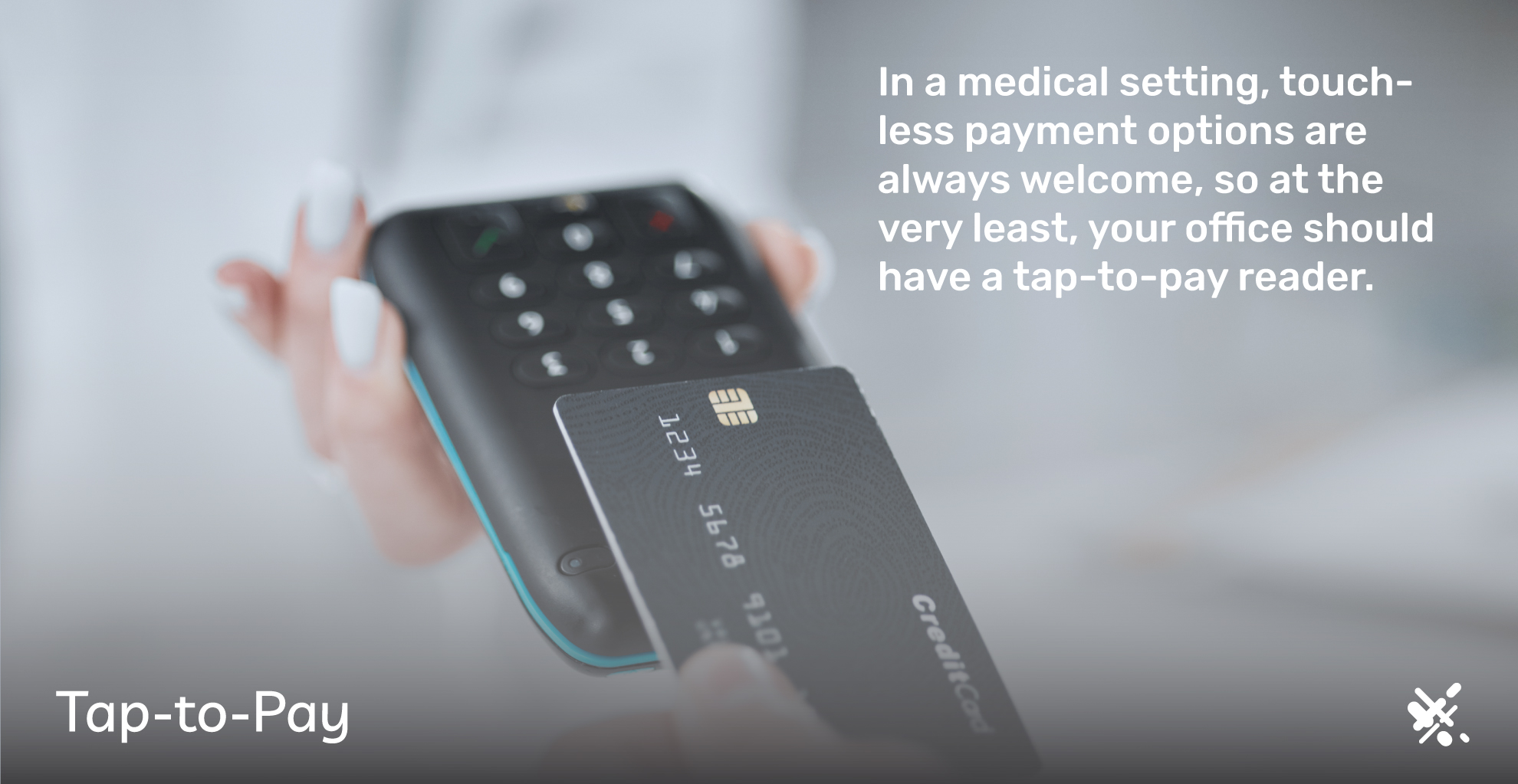
Tap-to-Pay
Another option is a tap-to-pay reader. This feature is most likely included if you purchase a reader for digital wallets. It allows for contactless payments but using a card instead of a smartphone.
In a medical setting, touchless payment options are always welcome, so at the very least, your office should have a tap-to-pay reader.
Finally, some prepaid medical cards use their own card readers or software. If your patients or office accepts these, you will need special readers or software, such as a Care Credit Terminal.
Payment Processing Solutions For Healthcare: Mobile Payment Options
If your practice offers services outside the office, such as mobile medicine or house calls, you’ll need mobile payment options. Mobile payment options mean that tablets, smartphones, or other wireless devices can accept credit cards.
Large healthcare facilities also employ these in scenarios where staff gathers information at various locations, not limited to the front reception area of an office.
This is much more common for veterinary credit card processing as many veterinary practices provide services outside their veterinary clinic.
Payment Processing Solutions For Healthcare: Virtual Terminal Perks
Virtual terminals allow your office to offer an additional channel for payment acceptance. Medical facilities can use a virtual terminal when the card and the customer are absent. The patient can submit the card number or banking information over the phone to complete the transaction.
Some patients who are uncomfortable with some of the newer digital payment methods may want to pay by phone. This can be true for senior patients who may have difficulty using a computer or smartphone.
A virtual terminal can also process ACH payments. So, even patients who prefer to pay by check can do so if you have a virtual terminal set up. During the initial transaction, your staff can also set up recurring payments to automate subsequent payments.
Recurring Billing
Recurring billing is mostly used for membership sites, but healthcare practices can also take advantage of this payment solution. This can be for concierge-style practices that charge a monthly or annual fee for access. It can also be used for installment or buy-now-pay-later style arrangements.
These are common in the dental field, where many procedures are cosmetic, and insurance plays no role in helping. An office can set up an installment plan using recurring billing for these situations.
Your merchant account tools can facilitate the setup of this recurring billing, automatically deducting the agreed-upon amount from the patient’s card or bank account. This works for credit cards, debit cards, and ACH payments.
Offering these types of recurring payments gives your patients more options for controlling their healthcare costs. It also enables the rendering of additional services that the patient may not have been able to afford otherwise.
This makes it perfect for increasing revenue while, at the same time, improving patient experience.
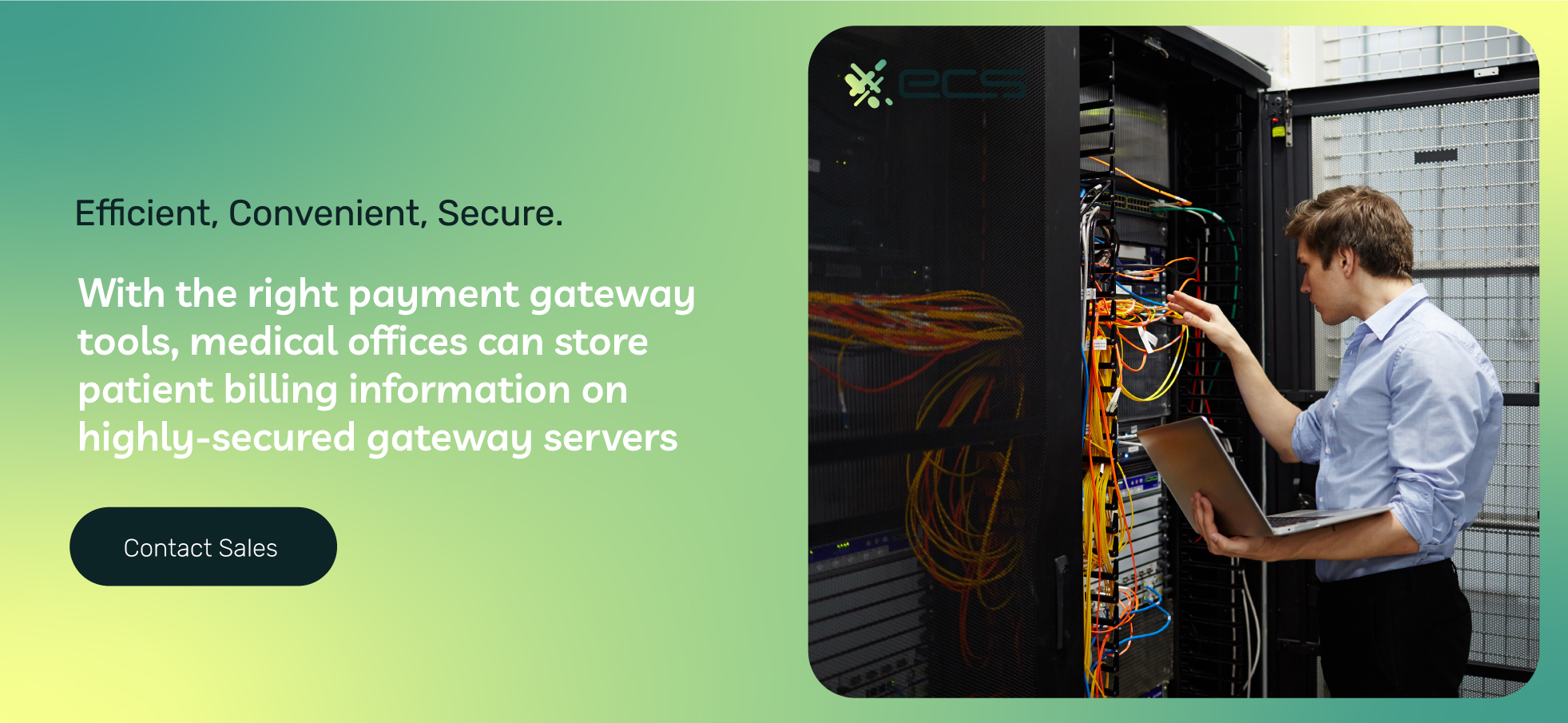
Patient Billing Information Storage
One hurdle that can slow down payments is the need for patients to re-enter their billing information every time they make a payment. Even with online payments or payment links, entering billing information like a credit card number adds friction and can result in delayed payments.
The problem for a medical practice is that storing billing information locally or on their servers is a big liability and requires high-level cybersecurity infrastructure.
However, with the right payment gateway tools, medical offices can store this information on highly-secured gateway servers. These servers are under the same security protocols as the entire credit card network.
All they need to do is follow the link, confirm the amount, and complete the transaction.
This streamlined payment method speeds up the payment process for the practice. If your practice wants more information on implementing recurring billing customer data storage to help improve payment collection, contact ECS Payments. Our team can help you easily implement these tools into your current billing workflow.
Automatic Card Updating
Recurring billing or card storage both work well. However, if there is a change in the card information, it can cause friction and missed payments. This means someone from the office has to contact the customer and ask for updated card information.
This takes time and can be avoided by using automatic card updating, a service offered by your payment gateway. This service automatically checks the patient’s issuing bank, which supplied the credit card. If any billing information has changed, your information on file is automatically updated, and charges can go through.
In medical practices, it’s not uncommon for months to go by between patient visits, meaning patient billing information can change as cards expire or new card numbers are issued. Using automatic card updating keeps your patient records up to date, and patients are never bothered with having to update their information.
Telemedicine Payment Processing Options
Telemedicine became popular during the pandemic, and now patients still want to enjoy the convenience of these video-based appointments when they have a healthcare concern.
Since the whole point of telemedicine is that the patient doesn’t have to come to the office, the copayment or full payment must be digital. Of course, a paper bill can be sent after the appointment, but we’ve already pointed out how slow and inefficient this is.
Instead, some of the methods mentioned earlier can be used to collect the payment. Since the patient is already at their computer, they can be sent a payment link that takes them directly to the payment page where they can either submit their information or, if the billing info is already on file, approve the charge.
In these cases, payment is immediate, and no invoicing is necessary.
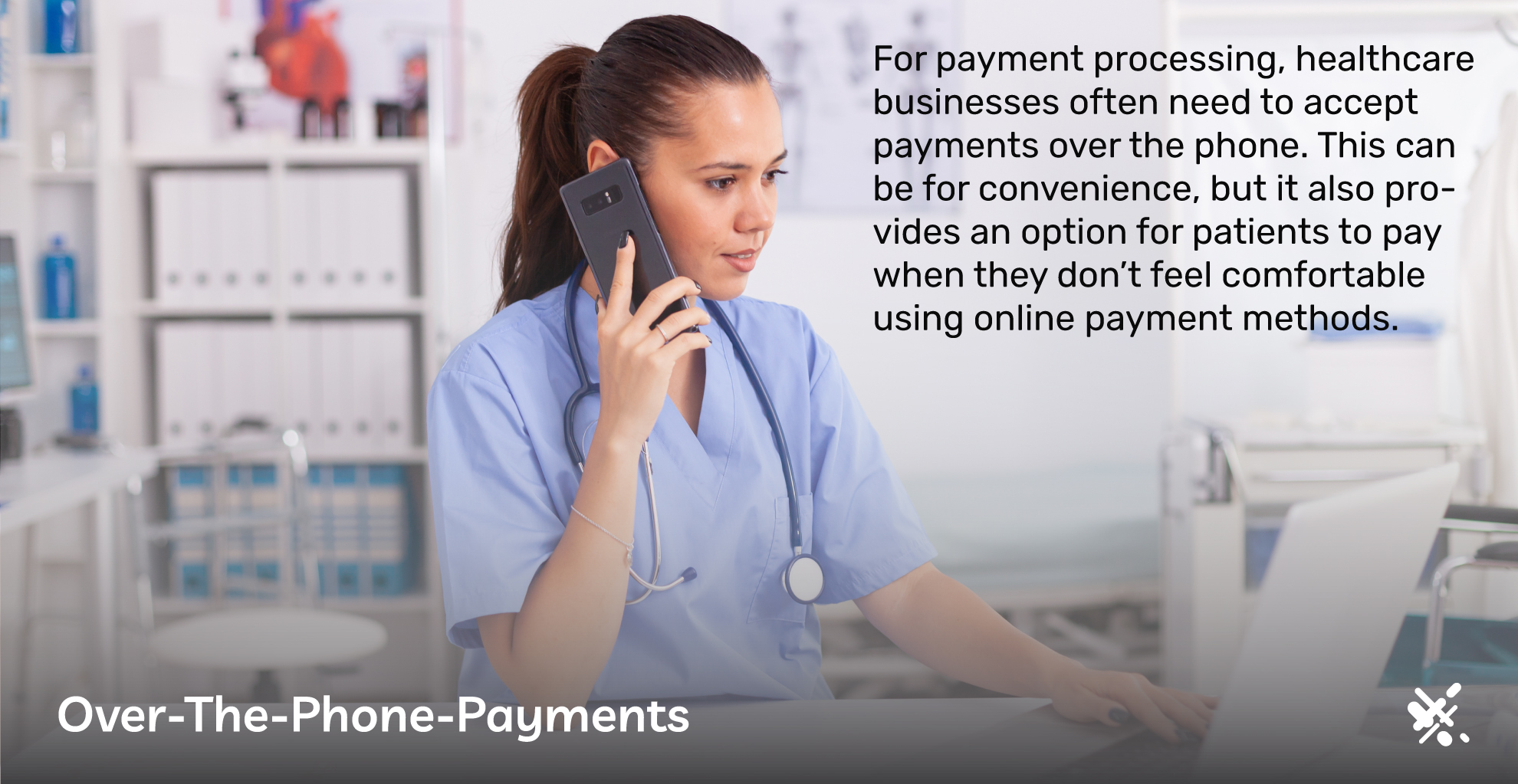
Over-The-Phone-Payments
For payment processing, healthcare businesses often need to accept payments over the phone. This can be for convenience, but it also provides an option for patients to pay when they don’t feel comfortable using online payment methods.
A virtual terminal is a software version of a physical card reader. Instead of a card being swiped, the credit card number is entered manually into the software. The transaction can then be run, and the payment received.
Virtual terminals should also be able to capture ACH information for those patients who pay by check and want to do so over the phone.
This is different from virtual card payments. With virtual card payments, healthcare businesses are sometimes reimbursed by insurance plans via a virtual credit card. These have high fees and should be avoided, but the fees are not related to your business’s credit card processing and are charged by the insurance provider.
Switching Payment Processors For Better Payment Processing Solutions For Healthcare
Many of these payment technologies that can lower your costs and improve patient experience require a compatible merchant account and a payment processor that can help you implement them.
You may need to research new credit card processing companies for healthcare payments so you can take advantage of these tools and reap their benefits.
Switching healthcare payment companies may seem difficult, but switching is rather easy since you’re simply changing how you connect to the credit card network.
Think of switching payment processors the same way you connect your laptop to the internet. When at work, you may use your work’s wifi, but then at home, you use your home’s wifi. Nothing on your computer changes; you access all the same networks via a new method.
Switching healthcare payment processing companies and securing a new merchant account is very similar. The entire transition is seamless, and nothing within your office software has to change other than how it connects to the credit card networks. Once those settings are changed, you can process with your new merchant account, but now, with the added features to help you streamline your billing.
If you’re already processing credit card payments, applying for a new merchant account is easy. You only have to provide basic information and your past processing statements. From there, your new processor has all the information they need to provide a merchant account tailored to your practice.
Switching credit card processing for medical practices does require some research and a small investment of time. However, this is time well spent. Finding better healthcare payment solutions that help you reduce costs and improve patient experience is a wise investment that pays dividends for years to come.
Learning More About Payment Processing Solutions For Healthcare
When you’re ready to update your payment processor, you want a partner that fully understands the healthcare industry and the available technology to improve your practice.
At ECS Payments, we specialize in high-risk processing and healthcare credit card payments. We offer the latest innovations, from digital wallet-enabled readers to payment gateway tools to streamline your invoicing and billing.
Contact ECS Payments today to speak with one of our experts in payment processing solutions for healthcare. We can explain all of the available tools and show you how you can reduce your costs and fees substantially with the right payment technology.
Frequently Asked Questions About Payment Processing Solutions For Health Care
Automating manual tasks and offering multiple payment options can streamline your payment processes. These implementations can significantly lower costs and improve the patient experience. Many medical practices opt for digital collection methods such as SMS and email invoicing, which are more efficient and preferred by patients. ECS payments makes it easy to integrate digital collection methods into your existing systems.
Patients expect a variety of payment method options, including credit card, debit card, ACH, and digital wallets such as Apple Pay and Google Pay. Offering multiple payment channels, such as payment links, virtual terminals, ACH, and recurring billing plans, can cater to diverse patient preferences. ECS offers a full suite of payment solutions. Contact us today to learn more.
To transition to a new payment processor, you must evaluate your existing setup and determine the compatibility of your practice management software with the new potential payment gateway. You should also evaluate your current contract to see if you will need to pay any early termination fees. ECS makes the migration process seamless. Contact us today if you are ready to switch.
Implementing the right digital payment technologies can result in more efficient billing, easier patient onboarding processes, improved patient satisfaction, and increased revenue generation.
